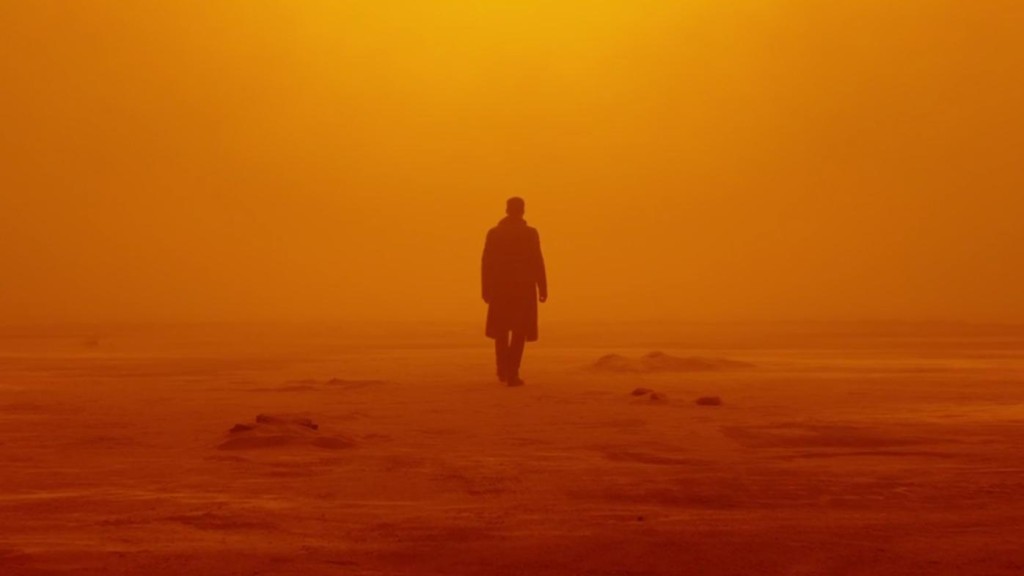1982’s Blade Runner was a melancholic neo-noir as impressive for its shapeless sorrow as for its far-reaching influence on sci-fi design and lexicon. In Ridley Scott, Hampton Fancher and David Peoples’ transformation of Philip K. Dick’s story, anyone with sense and money had escaped “off-world”, abandoning Earth to broken boys and their broken toys, the hazy urban air thick with the defeatism of gumshoe vice noir. The electric sheep of an Art Deco future-L.A., along with their shepherds and predators, drifted along in a kind of dreamworld, where identity and memory had turned fluid and suspicious, thanks to the Replicants, built to do everything better than humans, except feel, and even that wasn’t guaranteed. Among the questions about heritage and loose ends provoked by Blade Runner 2049’s return to the running was an emotional one: what is there after melancholy? Where, exactly, can you go?
The answer, it seems, is into emptiness, screenwriters Fancher and Michael Green and director Denis Villeneuve bringing to vivid life a ruined world without its bearings. The waking sleep ambiguities of Scott’s original are unsuited to Villeneuve, who can do strange and beautiful, but rendered in the cold, exact properties of reality. And this is some dose of reality: 30 years later, the blade runners are still on the beat, but things have gotten way, way worse.
On mid-century Earth, the population has just about survived ecological collapse, thanks to the bio-engineered farming of industrialist Niander Wallace (a monologuing Jared Leto), who’s taken over operations at Tyrell Corporation’s android assembly line. The off-world exile has expanded to nine planets and outside the Greater Los Angeles area, America is a haze of devastation, a wide foggy expanse of soil death and radioactive fallout. The city, where blade runner “K” (Ryan Gosling) hunts down illegal models for his L.A.P.D. lieutenant (Robin Wright), isn’t much cheerier, a great, dark, hulking mainframe soaked in misty rain and neon corporate monstrosities. His only respite is relaxing at home with holo-girlfriend Joi (Ana de Armas), whose projected image flickers and transforms, her layered translucence a reminder of reality’s fragile breakpoints. When a routine assignment of Replicant “retirement” springs up surprises, K pursues the case, caught in a web that involves a missing child and possible revelations about the state of homo-robo relations.
With its nuclear winter, bright lights and thematic interest in loneliness, family and wishes that we want to come true, Blade Runner 2049 is something of a sneak Christmas movie. It’s most emotionally engaging when it stays small, focusing on K’s romance with Joi, herself a Tyrell Corp product, and his shifts in self-conception, where the film makes sly, almost subversive, use of the mythology’s fixation on talismans and special symbols. Much of the expected conversations on ‘realness’ are thin and unchallenging, but 2049’s wittiest contribution to the question of ‘what makes human human’ is the centrality of ego and desire, and the ways in which we buy into our own hype. Maybe, it suggests, it is our delusional belief in our own specialness that makes us, well, special.
Blade Runner 2049 is undeniably beautiful, a succession of bleak triumphs from Roger Deakins, but in terms of story and feeling, it is frustratingly sterile. It’s wonderful to see a big studio release guided by specific directorial vision, like George Miller’s petro-cartoon Fury Road, but the opposite, a franchise genre piece built around Villeneuve’s silences and stillness, and his habit of confounding characters with extraordinary sights. But languidness isn’t the same as atmosphere, and the latter isn’t rich enough to sustain the near-3 hour runtime.
It’s unfair, of course, to expect something to match the newness of the 1982 original, but when so many of that film’s ideas have become mainstream, 2049 doesn’t push itself hard enough. In life and art, images of exhaustion and collapse have become the default ways of imagining the future, while AI-induced anxieties about consciousness and artificiality receive regular rinsing in works like Her, Ex Machina or HBO’s Westworld. The macro plotting, and the return of Deckard (an enjoyably garrulous Harrison Ford), lack urgency, and the central impetus of the action, although interesting in theory, isn’t unpacked with enough detail. 2049 is hardly fan service, but anyone unfamiliar with the original, or with a limited interest in the genre, is going to struggle to stay engaged.
Like one of Tyrell’s pleasure models, 2049 is seductive and striking, and almost tricks you into thinking you’re watching something great, but it’s an unnourishing experience, a little hollow and unreal. A flourish of wire and light. Conor Smyth







